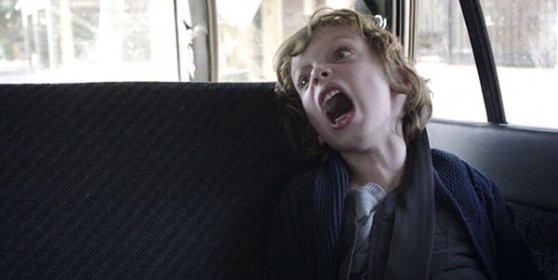24/31: The Babadook

Screen: Smoking Gun Prod.
A friend of mine once said that you don’t get over a death, the space it leaves. “It doesn’t go away; you just learn to decorate around it.”
It’s like a ragged hole in the floor, the friend said, an unfixable one, and eventually you find a configuration of your emotional furniture that works with it. “But you can’t act like it’s not there or you’ll just keep falling through.”
Fictional narratives about grief avoid the idea, the fact really, that these holes don’t close — understandably, because they’re narratives, and they require endings, which “you learn to deal with it, mostly” isn’t. It’s the point of human stories: when we make it up, we get to fix it up, straighten it out, get it right, happily ever after. The Babadook is one of the few movies I’ve seen that makes said idea its engine, and it uses a different metaphor — the grief is not a hole but a children’s-book villain made manifest, and at the same time he’s demanding to be let in, he’s also the only one who realizes he’s in already — but it brought that conversation to mind right away. Amelia (the outstanding Essie Davis) is struggling as a single mom to Sam (Noah Wiseman), a kid who’s weird in the way almost-seven-year-olds tend to be: needy, fearful, insistent on ridiculous charms. Amelia’s late husband died in a car wreck as he was driving Amelia to the hospital to give birth, so her ambivalence about Sam, whom she fiercely loves and steadily resents, is more crystallized than that of most parents — but her fed-up snarling isn’t all the growling cloaked Babadook that, as Sam says, won’t let her love him. It’s also fed-up snarling. Every parent, much older sibling, and caregiver recognizes it. You don’t always like your loved ones. You can’t always control who you blame.
The Babadook is scary, working the gotchae expertly, seldom showing the eponymous villain but alluding to Buffy‘s The Gentlemen and the unsnugglier aspects of Gorey drawings. More than that, it’s suffocating, inexorably building the jittery claustrophobia you felt as a kid when a parent was ill or an unpleasant guest came to stay. (The book’s predictions about certain twists did not help; one in particular had me clenched for 20 minutes.) By the end, that feeling is mostly gone, but not entirely, and not thanks to the customary horror exorcism that balances the ledger with the vengeful dead and banishes them whence they came. There is a cleansing of sorts, though, and as the Babadook and Amelia’s maternal instincts had their showdown across Essie Davis’s face in a single pained howl, I wondered how Felicity Jones scored an Oscar nomination for a serviceable but predictable performance ahead of Davis. She’s just brilliant, listening every second.
Tags: 31 Days 31 Films Essie Davis Felicity Jones kids movies Noah Wiseman The Babadook





“BabaDOOK” hold me
Essie Davis, the Miss Fisher Essie Davis? How do you like that!